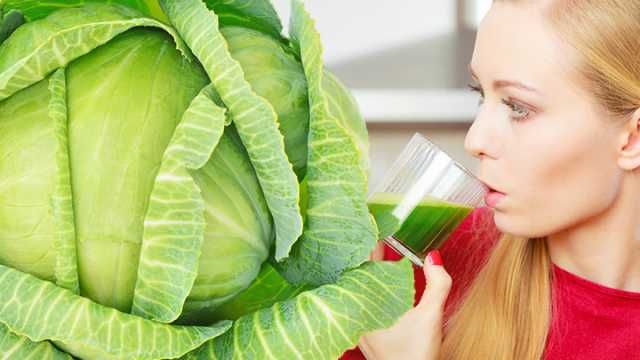
Most of you reading this article probably already know that cabbage is a very healthy vegetable. This unassuming member of the Brassicae family is filled with nutrients, and we should all be getting more of it on our plates. However, have you ever considered juicing your cabbage?
There are many good reasons to turn that head of red or green cabbage into some cabbage juice. For starters, juicing makes foods easier for our bodies to digest. This makes a lot of sense for people with digestive disturbances of various kinds. While it may be hard for people with sensitive stomachs to eat cabbage, many can handle the juice just fine.
Secondly, simply munching on cabbage may lead some people to develop gas, which can be both embarrassing and uncomfortable. Juicing your cabbage can remedy this situation. Thirdly, making your cabbage into juice is the first step to some very healthy beverages, such as rejuvelac (more info about this later).
For those of you thinking about breaking out the juicer, here are eight benefits of cabbage juice.
A wealth of nutrients
As mentioned, cabbage is filled with a wide variety of nutrients. While different types of cabbage have different nutritional profiles, all of them are very healthy. For example, red cabbage contains a range of B-vitamins, vitamin C, vitamin K, protein, fiber, copper, phosphorus, manganese, magnesium, iron, calcium and more. That’s a lot of nutrients in one glass of cabbage juice.
Boosting immunity

Because cabbage is so high in vitamin C, it is great for keeping your immune system strong and healthy. If you’re feeling under the weather, drinking a glass or two of cabbage juice is a great idea, since it may be easier to take it in liquid form. It may even help you to get over the bug more quickly.
Combatting inflammation
Cabbage contains many nutrients and antioxidants that help to control inflammation throughout your body. Red cabbage has the added benefit of anthocyanin content. Anthocyanins are flavonoid antioxidants that help to lower inflammation, fight free radicals, and encourage optimal wellness.
A 2008 study published in the journal Food Chemistry tested the anti-inflammatory effects of red cabbage pigments. On their results, the study authors wrote:
“The study showed that red cabbage juice (RC) exhibited anti-inflammatory effects against LPS-induced [lipopolysaccharide induced] inflammation of splenocytes via increasing anti-inflammatory cytokine interleukin (IL)-10 and decreasing pro-inflammatory cytokine IL-6 secretions.”
Fighting cancer
Cabbage contains a number of compounds which may help to prevent certain cancers, and even combat existing cancer cells. These compounds include lupeol, sinigrin and sulforaphane. The sulfur compounds found in cabbage have been specifically researched for their effect on cancer cells, with some exciting results.
Healing peptic ulcers
It has been known for a long time that cabbage juice may have benefits to those suffering from ulcers. On these benefits, the authors of a 1949 study published in the Western Journal of Medicine explained:
“The average crater healing time for six patients with gastric ulcer treated with cabbage juice was only 7.3 days, compared with 42 days, as reported in the literature, for six patients treated by standard therapy… The rapid healing of peptic ulcers observed radiologically and gastroscopically in 13 patients treated with fresh cabbage juice indicates that the anti-peptic ulcer dietary factor may play an important role in the genesis of peptic ulcer in man.”
Preventing and treating gastritis and gastric cancer

A 2013 study published in the Journal of the Korean Society of Food Science and Nutrition tested the effects of cabbage juice (alone and mixed with other juices) on gastritis in rats and on human gastric cancer cells. The study authors concluded:
“These results show that cabbage juice and cabbage-mixed juices, especially with chlorella or kale, exhibit remarkable anti-gastritic effects and can be administered for a long period for the prevention and treatment of gastric cancer and gastritis.”
Keeping your heart healthy
The nutrients and antioxidants found in cabbage can help to protect your heart. Specifically, the high potassium content of cabbage can help to improve circulation and regulate blood pressure, thus protecting your entire cardiovascular system.
Protecting the nervous system
Cabbage, particularly red cabbage, is high in vitamin K. This vitamin has many functions, and one of these is its role in protecting nerves from damage. Therefore, eating foods high in vitamin K may help to protect your brain and your entire nervous system as a whole.
Red vs. green cabbage
While all types of cabbage are healthy (unless they’re covered in pesticides, so choose organic), red cabbage seems to have the edge in most nutrients. Red cabbage generally contains more vitamin C than green cabbage, and also has the bonus of anthocyanins. Green cabbage, on the other hand, has more folate. So, get a healthy variety of both in your juices!
How to make cabbage juice
To juice cabbage, all you need is some organic cabbage and a high-powered juicer. First, wash the cabbage thoroughly and soak it in some warm water until all residue is removed. Feed the cabbage through your juicer one half at a time (quarter it if you have an especially large cabbage). That’s it!
You can also make cabbage juice with fermented cabbage. This adds a number of probiotic benefits to your juice, boosting both your digestive system and your immune system.
Rejuvelac
If you want to go the extra mile with your cabbage juice, try whipping up a batch of cabbage water rejuvelac. Rejuvelac is a probiotic beverage made with sprouted grains. It is said to help ease constipation and help the body absorb nutrients from food more efficiently. If you want to make your own, check out this recipe.
Have you ever made cabbage juice? What about cabbage water rejuvelac? Please share any tips you may have!
— Tanya Mead

